 |
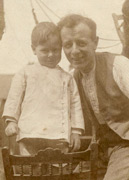 |
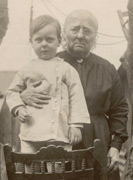 |
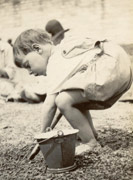 |
| Me with Mum |
Me with Dad |
Me with Gran |
A young me on the beach |
I started school in September 1926 at Callow Land Mixed Infants School in Leavesden Road, Watford. It was between Lowestoft Road and St Albans Road, just a short walk from home. All I can remember of the school is the assembly hall with, at one end, a large carved wooden rocking horse. There I learned to read and write. My arithmetic was rather basic, and consisted mainly of learning the 'times table' by rote.
One event at the school I remember was one bright 24th of May, Empire Day, when full of patriotism I took a large Union Flag to carry during the parade in the playground. The long pole had a pointed end and, accidentally, I almost dislodged a lady who was sitting on the school wall, and she was not pleased! On another occasion I collided with one of the many war wounded men when I was running to school. He cursed and swore at me and I was terrified. Remembering these events makes me think that I was 'happenstruck' even in those days (a word that some say I invented).
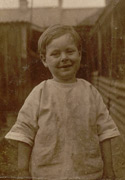 |
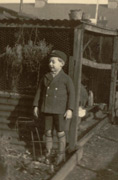 |
| Me beside the chicken run at 22 Lowestoft Road |
Me in my school uniform beside the chicken run |
The Jones family's link with our rural past was broken when my grandfather died. No longer did we have the horse and trap (Nobbler, an unbroken stallion would end his days in a field at Warlingham) and gone was the small holding in North Watford. But at 22 Lowestoft Road there were chickens to be fed and eggs collected, and I called the fan-tailed pigeons mine and ate their eggs.
Unlike most of my school friends, I was able to holiday at the seaside. We went to the Isle of Wight, which meant a journey to Waterloo station by Bakerloo tube, and a steam train to Portsmouth Docks, to board a paddle steamer to Ryde Pier station. From the pierhead a little steam train wheezed its way to Newport. We stayed at 109 Hunny Hill, Newport, with Uncle Joe and Aunt Mabel Cooper. Joe Cooper's brother Fred had married my mother's sister Nellie. They had met in the war when Fred, who was in the Isle of Wight Rifles, was stationed in Watford. 109 Hunny Hill was a little cottage next to a small chapel. Aunt Mabel used to clean and look after the chapel.
A broad track from Hunny Hill gave access to the cottage and to the small holdings beyond, where there was an abundance of vegetables and fruit. There were also pigs and piglets to see. Also, there was a large shed where Uncle Joe kept his car, a bull-nosed Morris. Much later the shed would house the Ford truck he used for his coal delivery business, and the generator which supplied electric light to the cottage, which replace the gas-vapour lamp of earlier years.
We went to the beaches at Ryde, Sandown, Shanklin, Ventnor and Freshwater by the Isle of Wight railway, which my cousins Leslie and Percy Cooper told me was mentioned in the Bible, it being one of the 'creeping things' in Genesis! On other days we had picnics on the bank of the River Medina. To get there we went "down Dodn'r", Dodnor Lane went past fields of meadow flowers and through swarms of butterflies. Our holidays were always taken in the first two weeks of August, and on the last night of the Cowes Regatta I would join the local kids who would throw paper streamers to form a flimsy barrier to cars making their way to the celebrations. Later we would watch the fireworks which were always "better than last year"!
At home we now had a radio. 'Wireless', as it was then known, was new, and 2LO was the first regular broadcasting station in 1922. Although radio had been invented in 1895, it was not until the 1920s that parts were available for amateurs, like Dad, to construct wireless sets. To buy radios was out of the question for most people because of the cost. I remember 'helping' Dad to cut and drill ebonite, an early black plastic-like sheet, to take control switches and dials. Dad constructed them for friends and relatives. A large wooden frame, wound with wire, took up a lot of space in a bedroom of an already crowded house, and I didn’t know why we didn’t have an aerial to a tall pole in the garden as neighbours had – Dad would know why the loop aerial was better, but I didn’t. Power was a problem. 'High tension' was a box of many flat 4½ volt torch batteries wired together. 'Low tension' was two accumulators, one in use and one 'on charge' at a local shop.
 Home
Home